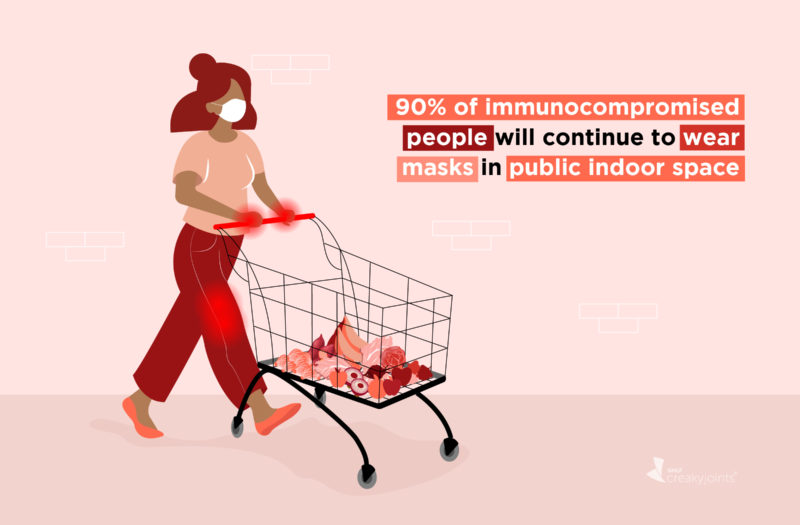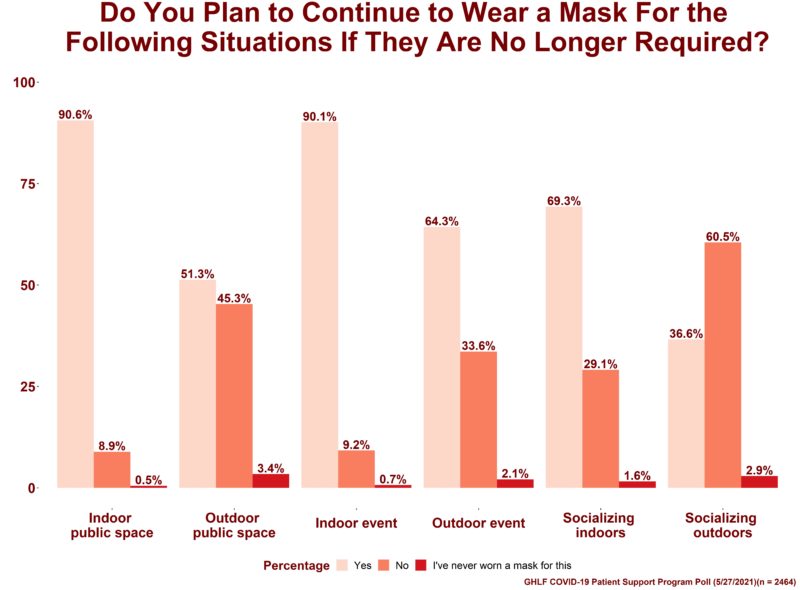Learn more about our FREE COVID-19 Patient Support Program for chronic illness patients and their loved ones.
Last month the U.S. Centers for Disease Control and Prevention (CDC) updated its guidance for fully vaccinated people, saying that those who are fully vaccinated “can resume activities without wearing a mask or physically distancing, except where required by federal, state, local, tribal, or territorial laws, rules, and regulations, including local business and workplace guidance.”
For many Americans, this announcement was a step forward; a step toward a “pre-pandemic” life free from masks and social distancing. But for those who are immunocompromised — as are many members of CreakyJoints and the Global Healthy Living Foundation — this announcement was a reminder that the guidance doesn’t always apply.
As with other guidance issued throughout the pandemic, the CDC’s recommendations also stated that, “if you have a condition or are taking medications that weaken your immune system, you may NOT be fully protected even if you are fully vaccinated. Talk to your health care provider. Even after vaccination, you may need to continue taking all precautions.”
This is because some evidence suggests that people who are on certain immunosuppressant medications may mount a weaker response to the COVID-19 vaccine and may be less protected from it. There are still many unknowns, though, about which medications and conditions make people at risk.
Members of the chronic illness community are understandably concerned about the changes in mask requirements. To better understand their concerns, we conducted a poll our COVID-19 Patient Support Program to gain insight into whether people who are fully vaccinated but immunocompromised would continue to wear masks, as well as how they felt about the new recommendations. Not surprisingly, most people who have chronic illnesses or autoimmune diseases don’t plan to stop wearing masks anytime soon — especially when indoors.
“There hasn’t been enough information to guide the immunocompromised population and their families,” one member of the Global Healthy Living Foundation (GHLF) community said in a free response portion of the poll. “How are we supposed to follow guidelines that don’t really apply to us?”
Nearly 2,500 people (2,464) took the poll. Of those:
- 91% said they are fully vaccinated
- 83% said they consider themselves immunocompromised
Here are some insights from the results:
Many immunocompromised people don’t feel comfortable taking their masks off indoors unless they’re with loved ones
As part of the poll, patients were asked if they would continue to wear a mask for various situations if masks are no longer required. Of the situations presented, three took place indoors.
When asked if they would continue to wear masks in indoor public spaces:
- 90.6% said yes
- 8.9% said no
- Less than 1% said they’ve never worn a mask for this scenario
When asked if they would continue to wear masks at indoor events:
- 90.1% said yes
- 9.2% said no
- Less than 1% said they’ve never worn a mask for this scenario
There was, however, one indoor situation where people with chronic illness were more willing to go with a mask: socializing indoors. For this, 69.3 percent of patients said they would still wear a mask, while 29.1 percent said they would not. (Another 1.6 percent said they had never worn a mask for this scenario.) The reason, based on answers in the free-response section, is more about the people than the setting.
“I am unmasked with family and friends indoors,” one respondent wrote. “But with church, supermarket, and other places, I am masked.”
“With a compromised immune system, I believe I still need to wear a mask around people that are not family,” another person wrote.
When immunocompromised people are socializing in smaller group settings with people they know, more are willing to not wear a mask than when socializing in settings with people they don’t know or in public.
More immunocompromised people are more willing to take off their masks outdoors than indoors
We also asked about mask-wearing preferences in outdoor settings. People who are fully vaccinated but immunocompromised are more willing to go without a mask when they are with people they know.
When asked if they would continue to wear masks in outdoor public spaces:
- 51.3% said yes
- 45.3% said no
- 3.4% said they’ve never worn a mask for this scenario
When asked if they would continue to wear masks at outdoor events:
- 64.3% said yes
- 33.6% said no
- 2.1% said they’ve never worn a mask for this scenario
When asked if they would continue to wear masks when socializing outdoors:
- 36.6% said yes
- 60.5% said no
- 2.99% said they’ve never worn a mask for this scenario
There Are Too Many Unknowns to Stop Wearing Masks
More than 2,200 patients filled in the free-response section of the poll, where they could share general thoughts about the new mask recommendations for fully vaccinated people. A common theme that emerged was that the unknowns — such as how much protection the vaccine offers for immunocompromised people and if other people who are not wearing masks are really vaccinated — are the reasons members of the chronic illness community will keep wearing masks for the time being.
Unknowns About Virus Variants
Some respondents said variants of the coronavirus — and the lack of information about them — were one of the reasons they would continue to wear masks.
“It seems misleading and ill-advised [to stop wearing masks] given that the vaccines are not 100 percent effective and that the variants are spreading,” one patient wrote.
Another echoed these thoughts, writing that the new mask guidance is “premature with the strong possibility of future unforeseen variants developing abroad. I will continue to wear a mask everywhere except outside at greater than 10 feet distance.”
Unknowns About Other People’s Vaccination Status
For some members of the chronic illness community, the decision to continue wearing a mask comes down to trust — or lack of it.
“I don’t trust that only vaccinated people will stop wearing a mask,” one patient shared. “I personally think many people will not get the vaccine and just stop wearing a mask, either because they don’t think the vaccine is okay or they are just lazy.”
“I live in an area where only a third of residents are vaccinated, and the rest are likely to not be vaccinated for political reasons, so I’m somewhat more hesitant to go without a mask indoors,” another respondent shared.
“As an immunocompromised person, I feel that my group has been thrown under the bus,” one patient said. “I absolutely do not trust that anti-vax people will mask up.”
But even knowing someone is vaccinated doesn’t always address respondents’ fears. As one person pointed out, “I am even leery of some people that I know that have been vaccinated, because I know they don’t worry about being around other people without a mask on.”
Unknowns About Vaccine Effectiveness
For many patients, the lack of information about the vaccine’s effectiveness for people who are immunocompromised or on immunosuppressant medications is the main reason they will continue to wear masks.
“[There is] not enough information available for immunocompromised people,” one patient wrote. “My health care team is frustrated because they cannot give patients information except to continue lockdown procedures as much as possible. As a health care professional, I feel [the] country is opening up too early [and we] need more time to investigate immunity efficacy of vaccinations and need for booster.”
Another patient echoed these thoughts, adding “I wish there was more guidance for us other than ‘vaccines might not be as effective.’ I’m the only one looking out for me and that is tough when the social messaging is telling everyone masks aren’t needed.”
“It puts immunocompromised people at risk, both because they don’t have the information they need to keep them safe, and because others don’t realize that there are some people who need to be protected,” another patient shared.
One patient noted that lack of information about how the virus and vaccine affect immunocompromised people is only part of the problem. The other part is the lack of information about immunocompromised people for the general public, so that others understand the issues with which the chronic illness patient community is grappling. They wrote:
“I wish so badly that while they were discussing the new freedoms, they would also counter it with warnings about the millions of people who are still at risk because of their illness and treatments. I once again am acutely aware of standing out as someone who has an illness, versus blending in with a fully masked population. One of my sincere hopes and outcomes from this is that people will be more aware of the millions around them that are vulnerable, and that they will consider protecting others, not just themselves.”
Get Free Coronavirus Support for Chronic Illness Patients
Join the Global Healthy Living Foundation’s free COVID-19 Support Program for chronic illness patients and their families. We will be providing updated information, community support, and other resources tailored specifically to your health and safety.
About the Patient Support Program Quick Poll
Members of our program have underlying health issues — such as inflammatory arthritis and other autoimmune conditions, heart disease, lung disease, diabetes, and more — that may increase their risk for COVID-19 complications. They are interested in understanding the best ways to stay safe during the pandemic and to be part of a community of people with similar concerns, questions, and fears.
We regularly poll members, who live in the U.S. as well as around the globe, about a variety of topics, including how the pandemic is affecting their lifestyle, mental health, chronic disease management, medication adherence, and more.
We use this information to inform the educational resources we provide and to inform other stakeholders — such as public health experts, policymakers, advocacy groups, health care professionals, and pharmaceutical companies — about chronic illness patients’ needs and concerns. You can participate in ongoing polls by joining the support program here.
Chronic Diseases in America. National Center for Chronic Disease Prevention and Health Promotion. U.S. Centers for Disease Control and Prevention. January 12, 2021. https://www.cdc.gov/chronicdisease/resources/infographic/chronic-diseases.htm.
When You’ve Been Fully Vaccinated. COVID-19. U.S. Centers for Disease Control and Prevention. May 16, 2021. https://www.cdc.gov/coronavirus/2019-ncov/vaccines/fully-vaccinated.html.







